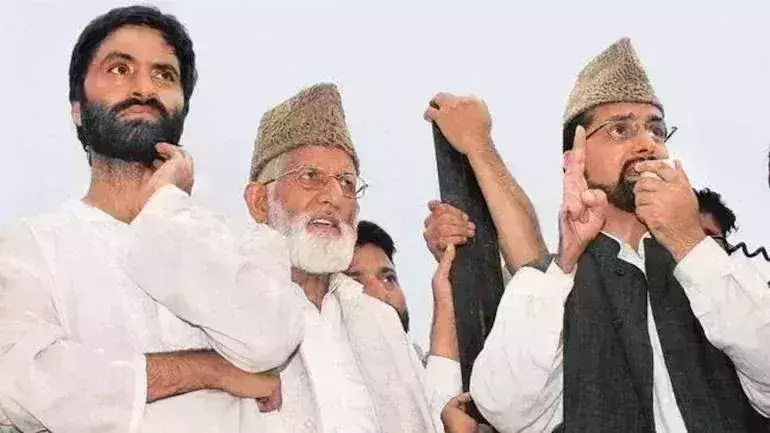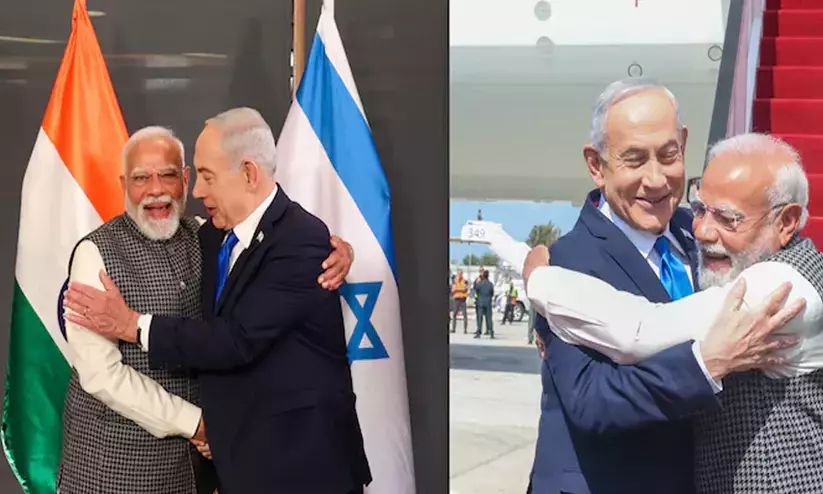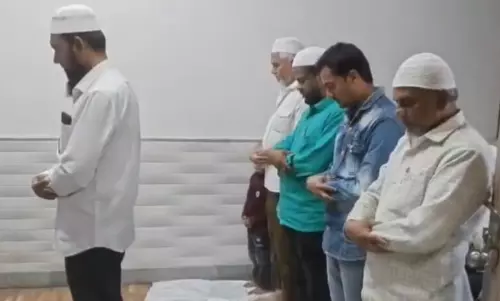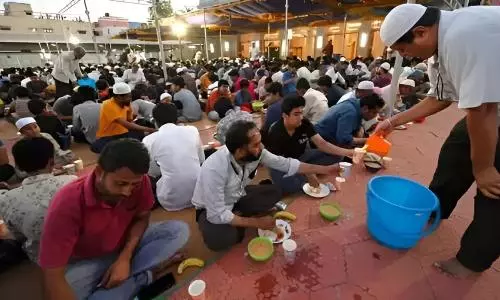

(L to R) Separatist leaders Yasin Malik, Syed Ali Shah Geelani and Mirwaiz Umar Farooq. (Courtesy : India Today File photo)
Both factions of Kashmir's Hurriyat Conference likely to be banned under UAPA
text_fieldsNew Delhi: Amid indications of ban on both factions of the secessionist conglomerate Hurriyat Conference, the Tehreek-e-Hurriyat, the extremist Hurriyat Conference faction led by Syed Ali Shah Geelani, on Sunday removed its signboard at the group's head office at its leader's residence in Srinagar's Hyderpora area, reports NDTV.
Quoting senior government officials, the report said that Hurriyat themselves removed the boards fearing action. According to officials, the ban would be under Section 3 (1) of the stringent Unlawful Activities (Prevention) Act. Under this section of the Act, if the Central government is of the opinion that any association is, or has, become an unlawful association, it may be notified as unlawful.
The report quoting officials added that the proposal of the ban was mooted in accordance with the Centre's policy of zero-tolerance against terrorism.
The officials were also quoted as saying that a recent probe into the granting of MBBS seats to Kashmiri students by institutions in Pakistan indicated that the money collected from aspirants by some organisations which were part of the Hurriyat Conference conglomerate was being used for funding terror organisations in the union territory.
The officials said a probe into funding of terror groups indicated alleged involvement of secessionist and separatist leaders, including the members and cadres of the Hurriyat Conference who have been acting in connivance with active militants of proscribed terrorist organisations Hizb-ul-Mujahideen (HM), Dukhtaran-e-Millat (DeM) and Lashkar-e-Taiba (LeT).
The cadres raised funds in the country and from abroad through various illegal channels, including hawala, for funding separatist and terrorist activities in Jammu and Kashmir, they said.
Many of the second-rung cadres of both the factions are in jail since 2017, they said.
Among those in jail are Altaf Ahmed Shah, the son-in-law of Geelani; businessman Zahoor Ahmed Watali; Geelani's close aide Ayaz Akbar, who is also the spokesperson of the hardline separatist organisation Tehreek-e-Hurriyat; Peer Saifullah; Shahid-ul-Islam, spokesperson of the moderate Hurriyat Conference; Mehrajuddin Kalwal; Nayeem Khan; and Farooq Ahmed Dar alias 'Bitta Karate'.
Later, JKLF chief Yaseen Malik, DeM head Asiya Andrabi and pro-Pakistan separatist Masarat Alam were also named in a supplementary charge sheet in a case of terror financing.
Another case that is likely to be cited for banning the two Hurriyat Conference factions is the one against PDP youth leader Waheed-ur-Rahman Parra, who is alleged to have paid Rs 5 crore to the son-in-law of Geelani for keeping Kashmir in turmoil after the death of Hizbul Mujahideen terror commander Burhan Wani in 2016, the officials said.
The NIA has alleged that after the death of Wani, who was killed in an encounter with the Army in July 2016, Parra got in touch with Altaf Ahmad Shah, alias Altaf Fantoosh, and asked him to ensure that the Valley was kept on the boil with widespread unrest and stone-pelting.
In June, Union Home Minister Amit Shah asked stakeholders operating in Kashmir Valley to keep a check on growing radicalisation. Following this, a number of raids were carried out in Jammu and Kashmir by the National Investigation Agency (NIA).
The Hurriyat Conference came into existence in 1993 with 26 groups, including some pro-Pakistan and banned outfits such as the Jamaat-e-Islami, JKLF and the Dukhtaran-e-Millat. It also included the People's Conference and the Awami Action Committee headed by Mirwaiz Umer Farooq.
The separatist conglomerate broke into two factions in 2005 with the moderate group being led by the Mirwaiz and the hard-line headed by Syed Ali Shah Geelani.
So far, the Centre has banned the Jammu-Kashmir Jamaat-e-Islami and the JKLF under the UAPA. The ban was imposed in 2019.






















